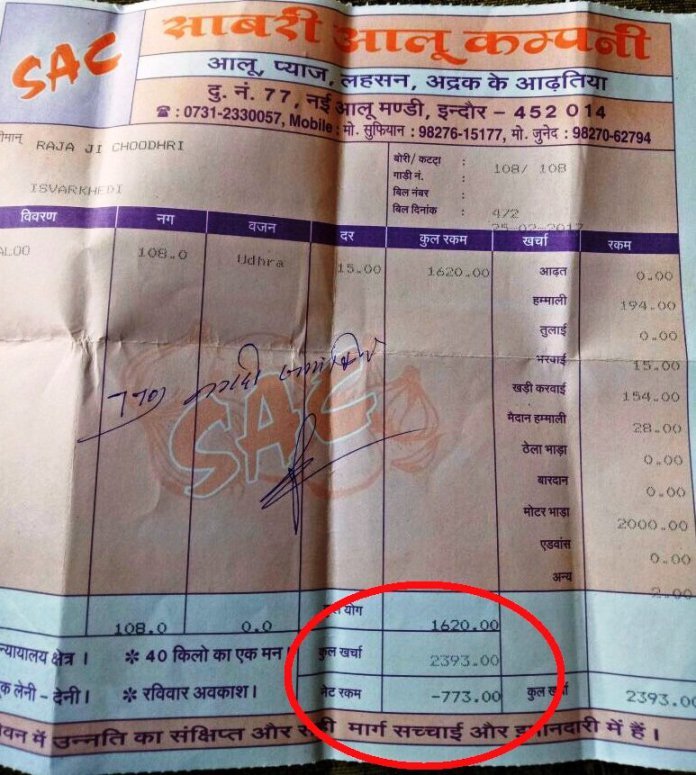
Madhya Pradesh: For 2000 Kg Of Potatoes, Farmer Got Rs 1, And For 108 Sacks Rs -773
6 March 2017 12:47 PM GMT
In Indore, a farmer took 50 sacks of potatoes to the market where the bid price was Rs 1175 but Rs 1174 was the cost charged for expenses in the market. The farmer got only Rs 1 after deducting different services and transportation charges.
Ishwar Khedi village resident Rajkumar Chaudhary has had 10 bighas (unit of land) of potatoes. On February 23, where he took 50 sacks of potatoes to the market, transportation fare was Rs 1,000 and Rs 174 went into other expenses. In the end, he got just Rs 1 in return on 50 sacks of potatoes.
Rajkumar’s story reached Farmers’ Union member Kedar Sirohi who tweeted copies of the bill to Prime Minister Narendra Modi and different departments of the government.
Rajkumar, like many farmers across India, is suffering due to the effects of demonetisation. Demonetisation led to a steep decrease in the prices of many crops and vegetables due to the cash crunch. Farmers bore the hardest brunt of this crunch. In Rajkumar’s case, he got back Rs 1 on a transaction involving 50 sacks of potatoes. Not only does this not cover the efforts and investment made by him in the first place, it also provides us a perfect picture pf the current state of the rural economy.
2000 किलो आलू की कीमत १ रुपया इसमें बताओ कितना रुपया किलो मिलेगा किसान को ? विद्वान गुना भाग और जोड़ कर बताये |@PMOIndia pic.twitter.com/Kb9Vyh3sH5
— Kedar Sirohi (@KedarSirohi) February 28, 2017
In another instance, Rajkumar got a net balance of -773 when he sold 108 sacks of potatoes in Indore. The bills for both these instances have been attached to this article.
The Farmers’ Union said that government apathy is directly responsible for this situation of farmers. “According to Farmers Union, in the past three months, more than three hundred farmers committed suicide in Madhya Pradesh due to crop failure or other reasons have had. Government said they are trying to make agriculture a profitable occupation and doing so many things for this, but the farmers get Rs 1 for two thousand kilograms of potatoes, therefore the government’s policies are questionable,” Bhopal Samachar reported.
Farmers are paying the prices of the wrong policies of the government. Some farmers are throwing potatoes on the streets and others are serving them to cattle. Things are worse in Punjab: the farmers started throwing potatoes on streets. In several places, farmers have expressed their opposition by throwing potatoes on the streets.
Farmers dump potatoes on a road due to falling prices at Kartarpur in Jalandhar – Punjab from Pratik Sinha on Vimeo.
Why has the rural agricultural crisis intensified in recent months?
Demonetisation has affected every Indian, but it has hit the agricultural sector the hardest. Farmers, who are the backbone of our national economy, were severely affected by the note demonetization of 8 November 2016 which invalidated 86% of India’s currency. Invariably, the majority of these effects were – and continue to be – negative in nature.
Agriculture in India accounts for 50% of the workforce. The agrarian economy of India is primarily cash-based and village-based. Farmers tend to be unable to avail digital services as such they tend to be digitally illiterate; in many parts of India, farmers don’t even have bank accounts. Their main and in many cases only source of income is from the crop produce of their land.
It must be noted that the timing of demonetization was highly damaging to farmers. It came following an above-average monsoon season, but farmers were unable to cash in on the benefits of abundant rainfall due to the overnight implementation. The situation was made more dire and desperate as most farmers have their savings only in cash and the winter sowing period was severely hit, and farmers were forced to sell their produce at abysmally low rates. Furthermore, when banks failed to exchange the farmers’ old notes or give them loans, local moneylenders exploited the situation by charging inhumanly high-interest rates.
A conversation between two farmers
For more information on how demonetisation affected farmers, please go to this link.
 All section
All section














